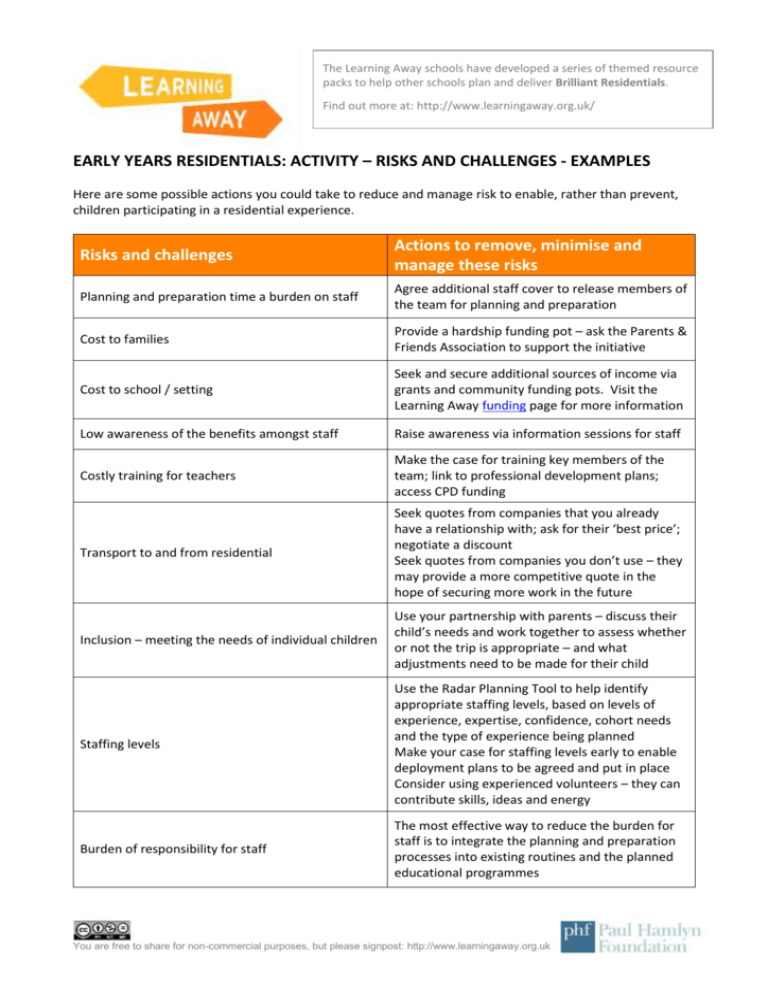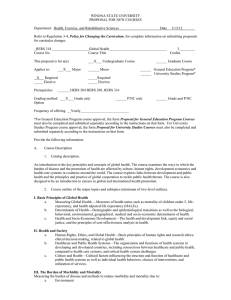Identifying risks and challenges – worked examples
advertisement

The Learning Away schools have developed a series of themed resource packs to help other schools plan and deliver Brilliant Residentials. Find out more at: http://www.learningaway.org.uk/ EARLY YEARS RESIDENTIALS: ACTIVITY – RISKS AND CHALLENGES - EXAMPLES Here are some possible actions you could take to reduce and manage risk to enable, rather than prevent, children participating in a residential experience. Risks and challenges Actions to remove, minimise and manage these risks Planning and preparation time a burden on staff Agree additional staff cover to release members of the team for planning and preparation Cost to families Provide a hardship funding pot – ask the Parents & Friends Association to support the initiative Cost to school / setting Seek and secure additional sources of income via grants and community funding pots. Visit the Learning Away funding page for more information Low awareness of the benefits amongst staff Raise awareness via information sessions for staff Costly training for teachers Make the case for training key members of the team; link to professional development plans; access CPD funding Transport to and from residential Seek quotes from companies that you already have a relationship with; ask for their ‘best price’; negotiate a discount Seek quotes from companies you don’t use – they may provide a more competitive quote in the hope of securing more work in the future Inclusion – meeting the needs of individual children Use your partnership with parents – discuss their child’s needs and work together to assess whether or not the trip is appropriate – and what adjustments need to be made for their child Staffing levels Use the Radar Planning Tool to help identify appropriate staffing levels, based on levels of experience, expertise, confidence, cohort needs and the type of experience being planned Make your case for staffing levels early to enable deployment plans to be agreed and put in place Consider using experienced volunteers – they can contribute skills, ideas and energy Burden of responsibility for staff The most effective way to reduce the burden for staff is to integrate the planning and preparation processes into existing routines and the planned educational programmes You are free to share for non-commercial purposes, but please signpost: http://www.learningaway.org.uk Risks and challenges Actions to remove, minimise and manage these risks Bureaucracy and form filling Be systematic; keep a record of the forms that have been completed and by whom Scan completed forms before posting them, to avoid having to do it again if they get ‘lost’ Keep standard information (e.g. insurance policies) that you need to use on multiple forms in an accessible place Asking too much of staff Impacting on staff home life Give the team plenty of advance information about the trip so that they have time to decide whether they can make arrangements to be away from home Attendance on the trip is likely to be difficult for one or two members of the team, however there will be plenty of ways that they can be involved before and after, so keep them informed and included and share the load Give time off in lieu to enable staff to recover from the additional demands Don’t always ask/expect the same members of the team to stay overnight; try a rota for annual trips Identifying a suitable location for a residential experience Talk to the local authority advisor; ask other settings or schools for recommendations; research online and read other users’ reviews Do the leg work – go and visit potential places yourself, or ask someone (teaching assistant / parent helper) to do an informal visit and give you their feedback Managing the expectations of parents and children Managing contact between parents and children Fears about health and safety and legal action Beforehand: Talk to parents about their thoughts, and ask for their opinion; ‘How will it feel for your child?’ Acknowledge anxieties and be reassuring, but also be prepared to share the decision not to take the child, if child and parent are not ready to separate During: Manage children’s expectations about contact by being clear about how, and how often, parents will be able to access information and updates whilst their child is away. It may be necessary to have a range of communication methods in place and discuss with parents what would work for them The Health and safety Executive (HSE) has published a myth busting statement explaining what teachers should consider when planning learning experiences beyond the classroom. Read it here You are free to share for non-commercial purposes, but please signpost: http://www.learningaway.org.uk






